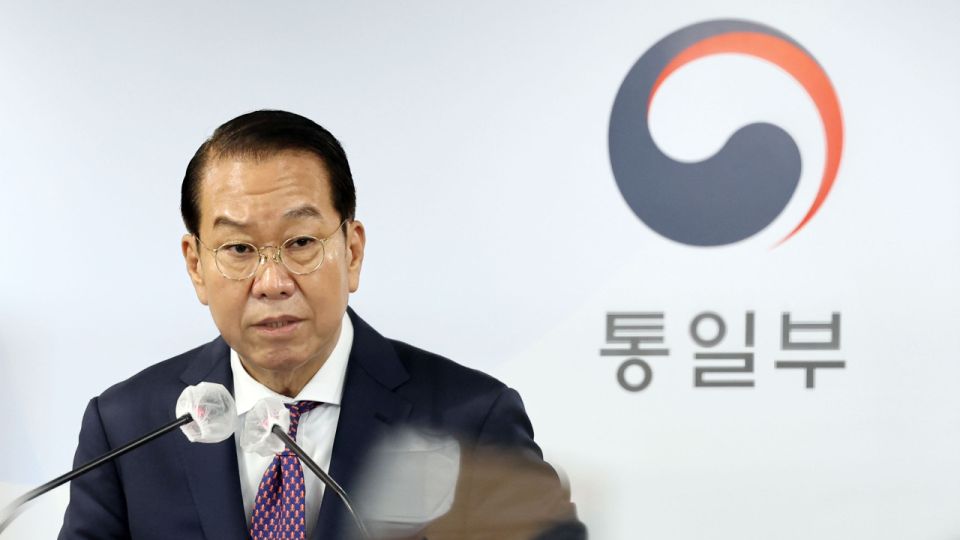September 9, 2022
SEOUL – South Korea’s unification minister on Thursday proposed to North Korea to hold inter-Korean talks over reunions of separated families at an early date, hoping that the meeting could serve as an opportunity to lift inter-Korean relations from a yearslong deadlock.
Unification Minister Kwon Young-se said the Yoon Suk-yeol government hopes to hold a face-to-face inter-Korean meeting between the authorities “as soon as possible to have a candid discussion on humanitarian issues” including reunions of families separated by the 1950-53 Korean War.
“The government publicly proposes to the North Korean authorities that the South and North Korean authorities should hold talks to discuss the issue of separated families,” Kwon said at a televised special news conference. “The government will engage in inter-Korean talks with a receptive attitude.”
Kwon underscored that the Yoon government will “actively consider” North Korea’s preference for the date, location, agenda and format of an inter-Korean meeting.
“We strongly urge the North Korean authorities to swiftly respond to our proposal.”
The South Korean government also sent a statement under the name of the unification minister to Ri Son-gwon, who serves as director of the United Front Department, through a communication channel at the inter-Korean liaison office.
The surprise proposal came as North Korea has ratcheted up bellicose rhetoric against South Korea.
Kim Yo-jong, North Korean leader Kim Jong-un’s powerful sister, openly said last month that President Yoon should focus on domestic matters rather than caring about inter-Korean issues, refuting his “audacious initiative” to achieve North Korea’s denuclearization.
Kim also clarified that North Korea “will never deal with” the Yoon government and respond to its overtures, adding North Korea’s “earnest wish” is that the two Koreas “live without being conscious of each other.”
But Kwon said he believes that today’s proposal could serve as an opportunity for the two Koreas to lay the groundwork to break the impasse and resume talks on other pending issues, when asked why he made the suggestion amid the continuing stalemate in inter-Korean relations.
“… We are really, absolutely expecting and hoping that we could expand (the agenda for inter-Korea talks) starting from the issue of separated families,” Kwon told reporters.
The unification minister repeatedly underscored that he will continue to propose inter-Korean talks even if North Korea remains silent this time, emphasizing the urgency of the issue.
Kwon said the two Koreas must promptly come up with measures to fundamentally resolve the issue of separated families by “utilizing every possible means.” The minister raised the necessity of holding reunion events for separated families “continuously and regularly.”
“The government is ready to make every effort to alleviate the pain of division at any time, anywhere and in any way possible.”
But Kwon elucidated that the Yoon government does not have any plans to offer “special inducements” such as food aid to North Korea to facilitate reunions of separated families.
“North Korea must respond given that the issue of separate families is a humanitarian issue,” the minister said, explaining the Yoon government will not offer economic incentives to bring North Korea back to the dialogue table.
Kwon also explained that he proposed the meeting because the two Koreas need to discuss “fundamental solutions” to the matter and reach a conclusion.
South Korea’s National Red Cross generally offered inter-Korean talks over family reunions.
Kwon went on to say that the authorities should meet to fix the situation where humanitarian issues have been affected by inter-Korean relations. In addition, the authorities would need to discuss additional measures for holding a reunion during the pandemic.
Kwon’s surprise proposal came a day before Chuseok, the Korean harvest holiday, which kicked off Friday.
The two Koreas held their last in-person reunion of separated families in August 2018 at the Mount Kumgang resort in North Korea after inter-Korean Red Cross talks. The reunion meeting was the first of its kind since 2015.
Seoul and Pyongyang held 21 face-to-face reunion meetings and seven video family reunions between 2000 and 2018, according to statistics provided by the Unification Ministry Thursday.
During the period, a total of 24,352 South and North Korean people from 4,847 separated families were reconnected.
But only 2.28 percent of South Koreans who have registered for a government-sponsored family reunion program have been reunited with their families in North Korea.
A total of 133,654 South Korean people have been registered for the reunion program as of this August. But only 43,746 people are survivors while the rest, which accounted for 67.3 percent, have died.
According to the Unification Ministry, 66.4 percent, or 29,035 people, of the survivors are in their 80s or older.


